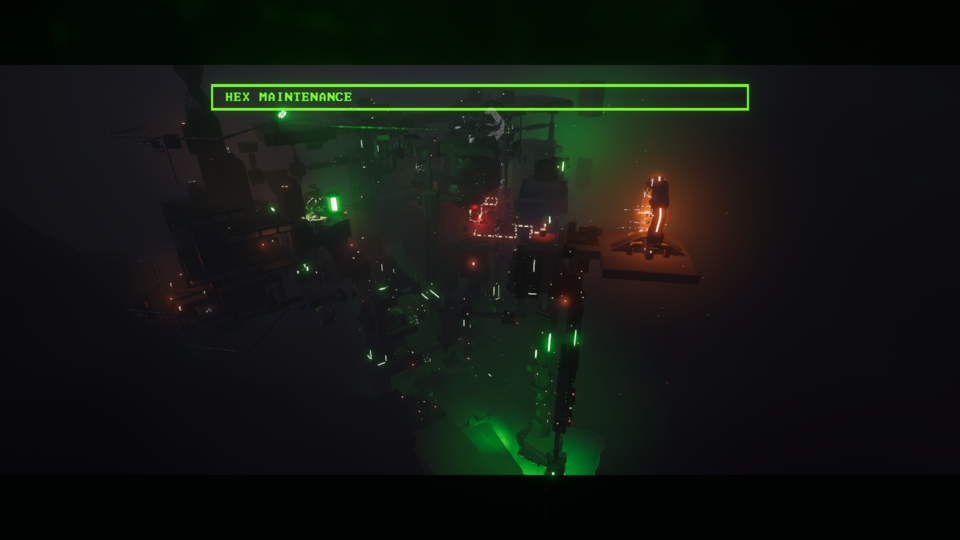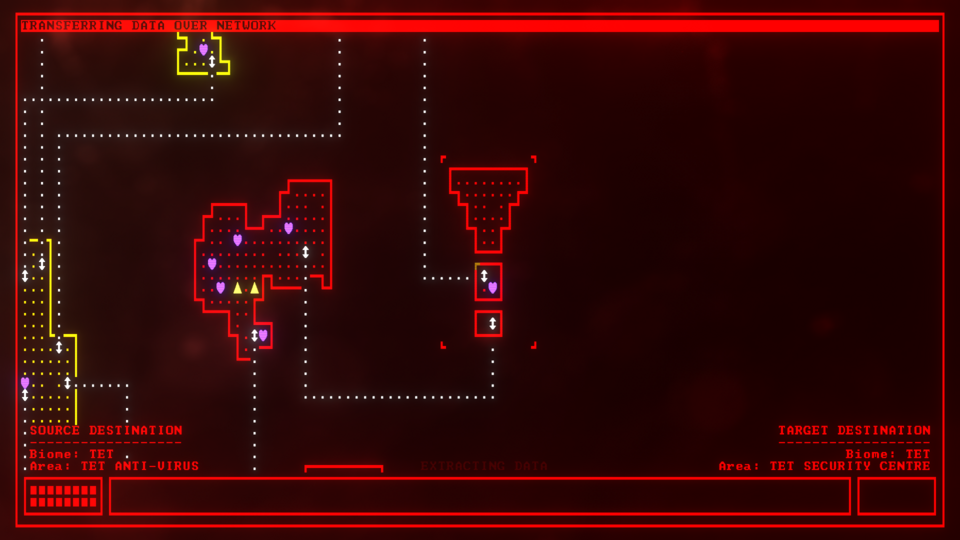
In my ongoing mission to exhaust Game Pass of all the explormers it currently has available before I'm forced to pay for it like a sucker, we come to the last one I could find: Phigames's Recompile from 2021. The game has you explore the dilapidated infrastructure of a long-dormant super AI as a sapient program introduced to the system with the ultimate goal of repairing as much of its programming as possible before integrating with the AI core at its center. The core isn't best pleased about interlopers and naturally stacks whatever security programs it has against you, though the advanced decay of these systems creates just as much of an obstacle. All the while you're finding files that represent recorded conversations between this AI, Hypervisor, and its original caretakers: a six-person advance team of scientists developing the means to colonize outer space. The files provide a glimpse into what eventually happened to the base and its inhabitants as well as an idea of the rum state of the world around it. Not to spoil much, but I got some Wings of Honneamise vibes from the epistolary story being offered.
Unlike many of its Indie peers, Recompile is a 3D explormer: less a situation like Metroid Prime where you explore via a first-person shooter format but closer to a third-person 3D platformer with combat and traversal upgrades to acquire along the way. The goal is to repair each of the mainframe's four main systems—Security, Data Processing, the Comm Relays, and the Biosphere being developed for terraforming—before opening the path to the AI Core and merging with it. Early on the game divides its attention between platforming (there's a lot of it, especially when you hit the Comm Relays), combat which has a sort of Ratchet & Clank feel to it as it's mostly third-person shooting with a selection of "weapon" codes to use and lot of evasive actions needed to avoid retaliation, and some hacking puzzles that involve redirecting a power supply through a system of AND, OR, and NOT logic gates that largely comes down to hitting buttons with the correct timing rather than anything too coding-intensive. What's more, some of the upgrades you pick up are hacking-based: this lets you brute force many of these logic gate puzzles simply by changing their behavior, though you're limited in how often you can do this as hacks use up currency earned from defeating foes. Later on, the hacking even lets you destroy enemies or reprogram them to fight for you, which trivializes the combat if you can afford it. Each system has its own set of objectives but for the most part it involves getting to the end of the area while activating everything that needs activating, the latter often opening the path to the former regardless.

I'd say Recompile's greatest strength is how it makes the upgrades, and the traversal upgrades in particular, feel monumental. I've already talked about how certain hacking upgrades can significantly reduce the amount of combat you have to deal with—ideal, because the game has a lot of fast-moving drone enemies that are annoyingly tough to hit—while the traversal throws all manner of double- and triple-jumps at you until it eventually just lets you fly anywhere. The combat upgrades all relate to the weapons you find: despite their coding-based nomenclature, they tend to act as familiar firearm mainstays like a shotgun, a weak SMG, or a powerful grenade-launcher that can hurt you with its splash damage if you're not careful. The platforming improves with each new traversal upgrade—it's often tough to judge distances in the game, since everywhere's so dark that you don't always cast a shadow you can use to line up with the platforms beneath you—but the combat never really does. To compensate for how easy upgrades can make the game, the bosses are always absolute nightmares to deal with: it's recommended you keep the slow-motion upgrade you acquire active at all times during these encounters just because they all move so fast it's hard to anticipate them.
However, for as much as I wanted to like this game—3D explormer! Tron-like internal computer world to explore! Lots of data logs to read that slowly reveal a tragic backstory!—I have to admit that it's both kind of dull to explore and half-baked in many aspects. Those logic gate puzzles I mentioned? They dry up completely after the first two worlds, and weren't really all that compelling to start with given how much of them could only really be solved through trial and error. The fourth world, inside the Biosphere, is just one huge cave heading downwards that was a confusing place to navigate for collectibles (fortunately, said collectibles are logged in the order they appear in the stage, so you usually have a good idea of whereabouts you may have missed one). The four zones are available almost from the outset but the game wants you to tackle them in a specific order: what's annoying about this is that there's no indication whether you're supposed to go to the red world (Security) or the green one (Data Processing) first since their portals are right next to each other, and it's only upon reaching the very end of Data Processing that you find a gap you cannot cross without an upgrade found in Security: this also means having to walk all the way back to the start of the area to exit, as a zone's shortcut back to the hub only opens up once you've completed it. One way you could've avoided this confusion is by seeing the order these zones appear on the collectibles list: Security is above Data Processing. However, Biosphere (blue) is also above Comms (yellow) but you can't even enter the former without an upgrade from the latter. The inconsistency and the linearity (despite the open structure suggesting otherwise) aren't the worst traits a game can have, but they are symptomatic of what often feels like an overambitious game that didn't quite come together like its developers intended. Given how few 3D explormers there are in the Indie space (or, indeed, available at any budgetary level) might also suggest developing them is more trouble than it's worth.

There's certainly aspects of Recompile I like, particularly the way traversal expands in huge leaps both figuratively and literally and the various conversations happening across all the found logs, but the game has some significant structural and gameplay issues that it cannot overcome. That each boss fight is progressively more insane to compensate for all the equally insane upgrades you keep finding never really feels like an adequate response to the feature creep—most bosses are capable of squishing you in a fraction of a second, which makes the way they occasionally drop health despite all their attacks being one-hit-kills has me thinking someone futzed with their damage parameters just as the game was going gold. The one positive impression I do get is that the developers must've learned a heck of a lot while making such a challenging project, one that belongs to an extremely rare genre I'll reiterate, that I've no doubt if they attempt another in the same vein it'll be a much smoother process and a much better realized result. As it is, Recompile is an unfortunate case of "close but no cigar".
Rating: 3 out of 5.
| < Back to 303: The Gunk | 001-100 | 101-200 | 201-300 | > Forward to 305: Bugsnax |
Log in to comment